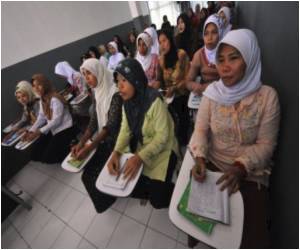Undeterred by sickening tales of abuse, Indonesian women are lining up to work as maids in Saudi Arabia where in just a few years they can achieve an almost unthinkable dream -- financial

One recent example was so shocking it prompted Indonesia to summon the Saudi ambassador and send a ministerial delegation to the oil-rich kingdom.
Sumiati Binti Salan Mustapa, 23, remains in hospital in Medina after her employer, a Saudi woman who has since been arrested, allegedly beat her causing internal bleeding and broken bones, scalded her head with an iron and slashed her with scissors, leaving her horribly disfigured and traumatised.
Earlier in November the beaten body of another Indonesian maid, Kikim Komalasari, 36, was found near Abha. Two people, her employers, have been arrested in that case.
Labour activists and rights groups have said the latest incidents highlight the paucity of protection for millions of mostly Asian domestic workers in Saudi Arabia and the Gulf states.
But Saudi-bound women at a maid training course outside Jakarta dismissed them as isolated episodes, and said they were confident their future employers would treat them well.
Advertisement
The 25-year-old has already done a stint as a factory worker and waitress in Malaysia, but found she spent too much of her wages on living expenses.
Advertisement
Another maid, 22-year-old Muslika, said: "The news did scare me but I’ll work hard, be patient and pray that God will protect me from crazy bosses."
Like Utari, Muslika hopes to save most of her future monthly salary of 800 Saudi riyals (213 dollars) to buy a house and open a clothing boutique when she returns to her Southeast Asian homeland.
For similar work with a family in Indonesia she would earn only about 80 dollars a month.
"My elder sister also worked in Saudi and she’s having an easy life now. She can afford a house, a grocery shop, even a paddy field," she said.
Around 70 percent of the 1.2 million Indonesians working in Saudi Arabia are domestic helpers, officials said.
Despite their humble origins, rudimentary education and low wages, Indonesia’s expatriate maids and, on the male side, construction workers, are major contributors to the country’s burgeoning economy.
The 4.3 million Indonesian workers abroad -- the vast majority in menial labour -- repatriated 6.6 billion dollars in earnings in 2009, according to government agency in charge of placement and protection of such workers.
By comparison, those earnings exceeded total bilateral trade between Indonesia and Saudi Arabia, which reached 4.1 billion dollars in 2009.
The government works with recruitment agencies to prepare maids with simple courses of two to three weeks, involving basic Arabic lessons and instruction on how to cook biryani spiced rice and iron Saudi men’s headscarves.
Most Indonesians, although Muslims, do not normally wear headscarves or Islamic dress.
At one session in Jakarta, the maids cracked up laughing when a trainer gave them the following advice: "When your Saudi employers tell you to ’naum’, they mean go to sleep. Please don’t mistake it for ’minum’ (drink) in Indonesian, and start drinking lots of water".
Mariah Mursyid, 44, said the four Saudi employers she had served over the past 17 years had treated her kindly.
"We’re like family. I’ve performed the hajj pilgrimage three times, all expenses paid by them. They telephone me now and then to ask how I am," she said.
Source-AFP









